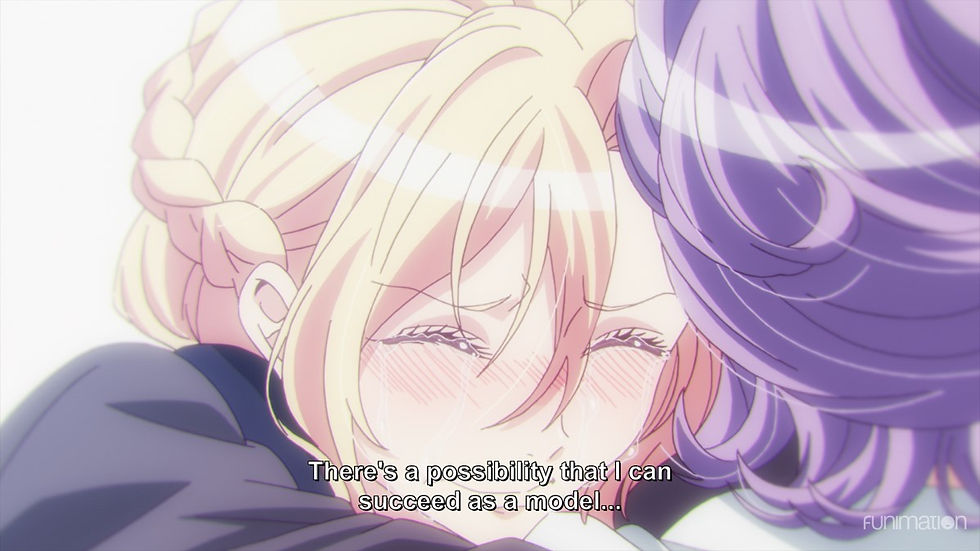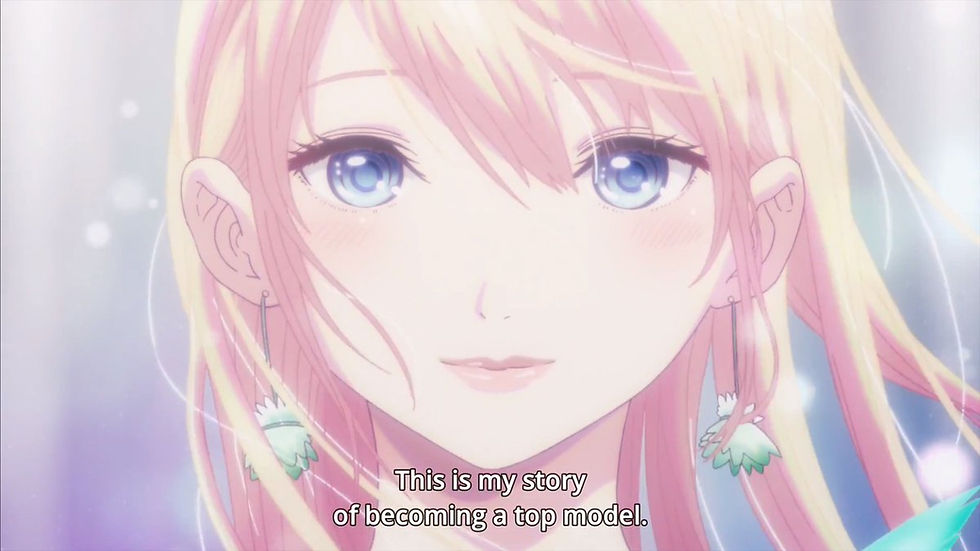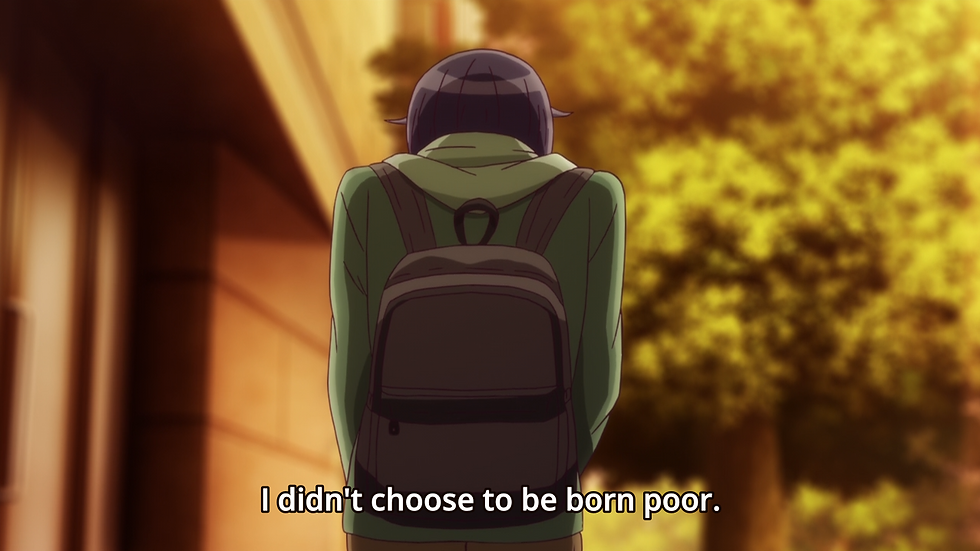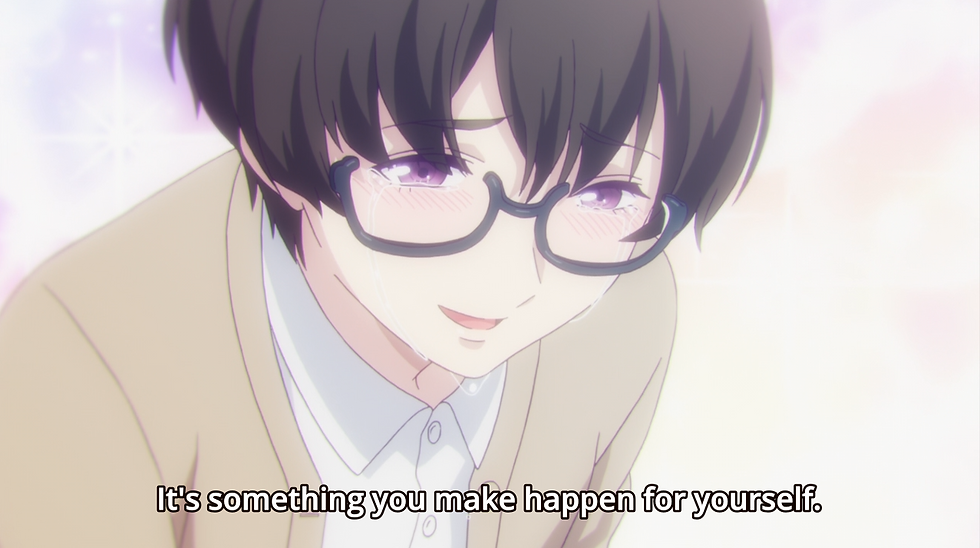Anime Review: Smile Down the Runway
- Sep 5, 2020
- 6 min read

Alternative Names: Runway de Waratte
Score: 7/10, 5/5
Length: 12 Episodes
Genre: Drama, Job Shadow, School Life, Comedy
Availibility: Available on Funimation, Hulu, AnimeLab, YouTube
It's always a rare treat to find a series that is brimming with creative passion and a love for its subject matter that's so strong that it's hard not to get pulled into the hype gravity. Yet, rare as these kinds of shows might be, the Winter 2020 season gave us no fewer than two. The first, Keep Your Hands Off Eizouken, I've already talked to death simply because of how much it was in my wheelhouse. The second was Inoya Kotoba's Smile Down the Runway, a series about designing and modeling clothing with some strong but oddly fitting shounen sensibilities. Beautifully adapted by the team at Studio Ezόla, Runway offers a simplistic but grounded story about defying social and industry standards to make your dreams a reality.

This is, for context, a far cry from Ezόla's two other titles: the psychological horror/yuri anime, Happy Sugar Life, and the pointlessly bleak ecchi comedy, Are You Lost?!.
Put more simply, Runway is your basic underdog story that is focused on two protagonists fighting to break into two industries that are so strict and traditionalist that they actively deter young talent. The first protagonist we meet is Fujito Chiyuki, the daughter of a respected modeling agency owner whose only dream is to become a runway model for her father's company. In a cruel twist of fate, though, Chiyuki's dreams are crushed under the 5 inch (12 cm) gap between her and the 5'7" (170 cm) minimum height requirement to be a pro model. Forever trapped at a lowly 5'2" (158 cm), Chiyuki is forced to constantly fight for her place in an industry she was groomed for but was barred from once she stopped growing. Rather than giving up or setting for a career in product and fashion modeling, though, Chiyuki stubbornly pushes to make the movers and shakers in the industry see and accept her for who she is--a professional model who is as determined to take the world stage as she is passionate about the industry that raised her.

And boy does that passion show in everything she does and says.
Runway's second protagonist and the one that holds the lion's share of the series' focus is Tsumura Ikuto, the eldest son of a single-parent family and the general caretaker for his three sisters and hospitalized mother. Whenever Ikuto isn't caring for his family's needs, though, he can be generally found working on some clothes designs for them and making the most of what few materials he has access to and can afford. This habit of making and designing clothes expresses what little hope he has of fulfilling his childhood dream of becoming a fashion designer. Since the materials and education required to become a professional designer are well outside what he and his family can afford, though, he believes that his dream is all but dead. However, after a chance encounter with Chiyuki in which she demands that he design and make her next modeling outfit, Ikuto's childhood dream and passion for making clothes are reignited.

And, as an extra bonus, a beautiful friendship and potential romance are born.
As the series goes on, the story focuses more on Ikuto and his development as a fashion designer. Yet, while I might be normally annoyed by the sidelining of a strong female character, I actually have zero complaints with it in this case simply because Ikuto's story is infinitely more engaging. In comparison to Chiyuki, he starts the series off at a far lower point of capability than her. Where Chiyuki has been trained to be a pro model since she was born, Ikuto is a talented amateur at best. Sure, Chiyuki still has some professional growing to do before she can hope to take the stage but that's leagues better than Ikuto's position. On top of starting at a higher level of competency than Ikuto, it cannot be ignored that Chiyuki also starts off in a better social and financial position than her counterpart. She is the daughter of a famous modeling firm owner and is given an infinite number of second chances to join his company professionally. She has connections to several professionals in the industry and dozens of smaller agencies who would kill to get her on the cover of their fashion magazine. In comparison to the unbelievably entitled position Chiyuki was born into, Ikuto has next to nothing, thereby making his eventual growth and successes feel much more important.

So, forgive me if I'm less interested in the story of a privileged white girl finally gets to become the thing she was born and bred for.
Now, to be clear, when I say that Ikuto has next to nothing, I mean his family is more or less living off Welfare. In a single-parent home with three kids in high school, one in kindergarten, and a mother whose hospitalization has left them with no income, it's frankly astounding that Ikuto hasn't dropped out of school to support his family already. Because of this, it ultimately becomes something of an understatement to say that Ikuto has more on the line when he risks breaking into an expensive industry than the silver spoon-fed Chiyuki. From his constantly walking a floss-thin tightrope that could turn his dream into an even greater financial burden on his family to the ticking time bomb that is his mother's health, there's never a dull moment to be found when Ikuto's story is at the forefront.

Sure, it might dip into the melodramatic at times, simply because of how much drama Ikuto's story
can throw at you in a single moment, but those moments of intensity are few and far between.
Yet, as much as I'm inclined to lean into Ikuto's myriad struggles, the fact of the matter is that his financial problems and family issues are mostly just background noise. They are a constant, looming threat and a card that could be played at any moment to up the stakes or give him a swift kick while he's down but that's really all there is to them. When it comes to the actual focus and push behind Ikuto's story, hope and determination reign supreme. What's more, the main source of that hope is Ikuto himself. No matter how bad things get for him or how badly he's been beaten, Ikuto constantly proves himself to be the kind of person who'll table his own problems to help someone else get through theirs. While this attitude of selflessness often gets him in even more trouble, it also encourages those around him to support him once it all becomes a little too much. In fact, one of the biggest draws of the show is how it turns this pattern of individuals supporting one another into a movement.

Like every movement, though, the change that happens doesn't just affect the movers and shakers, it inspires change for so many other people.
Much like Pay it Forward, Runway gains a lot of emotional clout simply because it focuses on showing how its cast of characters work to help each other and the people around them. Watching Ikuto and Chiyuki pick each other up and push each other to grow, both as people and professionals, makes them, their struggles, and their stories that much more endearing and impactful. But this pattern doesn't stop with just the two of them. From a model who desperately wants to become a fashion designer to an established designer who has been working to make his own line of products and a child prodigy who might just need a big slice of humble pie, both Ikuto and Chiyuki go out of their way to help their fellow professionals while also acknowledging them as rivals. Whether it's through directly offering a helping hand or pushing someone to improve by issuing a direct challenge, they help their generation of models and designers reach for the stage they've all dreamed of--the world stage in Paris.

While I can't say I'm nearly as fond of Runway as I am it's contemporary, Eizouken, it still stands as a rare example of a series that is so magnetically passionate toward its subject matter that I couldn't help getting drawn in. Everything about this series, from its characters and well-paced, down-to-earth drama to its uplifting themes and gorgeous artwork, made it into something I couldn't help getting invested in once it made its premise known. Even when, after the fact, I find the restrictions Chiyuki faces more than a little absurd and struggle to see how Ikuto's family functioned on any level without some form of income, any nit I'd normally want to pick with the series evaporates once I start recalling how much I enjoyed it and inevitably get pulled into its hype orbit. Bizarre as their other titles are, Studio Ezόla and its team of relative newcomers to the industry proved that they can make something really good and I honestly can't wait to see what series or genre they'll tackle next.


Comments